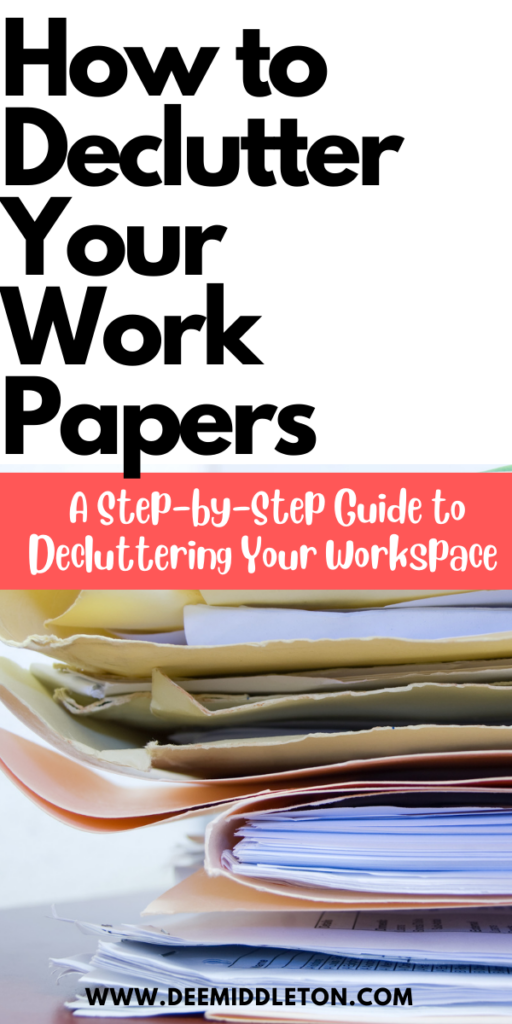5 Essential Papers to Keep During Declutter

Understanding the Importance of Documentation

In today’s fast-paced, digital world, decluttering has become more than just a trend—it’s a necessity for maintaining mental clarity and physical space. However, in our quest to streamline our lives, we often overlook crucial documents that need to be preserved. Keeping essential paperwork in order is not just about organization; it’s about safeguarding your financial stability, legal rights, and personal history. Here, we delve into the five essential papers everyone should retain even during the most enthusiastic decluttering session.
1. Identification Documents

Your identification is the cornerstone of your existence in society. These documents are pivotal for everything from voting to securing employment or conducting any official business. The following are the must-have ID papers:
- Birth Certificate: This document establishes your identity and citizenship. It’s vital for obtaining other documents and can be used to prove your age.
- Passport: Not only useful for international travel but also serves as an all-encompassing ID document.
- Driver’s License or State ID: Essential for daily activities like driving or purchasing age-restricted items.
- Social Security Card: A critical component in your tax filings and social security benefits.
Remember to store these in a secure place, like a fireproof safe or a safety deposit box, and consider having digital copies for backup.
🔒 Note: Always keep ID documents secure to prevent identity theft.
2. Financial Records

Financial documentation can seem like a tedious affair to manage, but keeping the right records can save you from potential legal or financial headaches. Here are the key financial papers:
- Tax Returns: Keep at least the last 7 years to comply with the IRS statute of limitations for audits.
- Bank Statements: Useful for monitoring account activity, disputing charges, or proving income.
- Retirement Account Statements: These should be kept to track contributions, earnings, and distributions over the years.
- Mortgage or Lease Agreements: Important for tax purposes, legal disputes, or to prove residency.
💡 Note: Shred bank statements after they are no longer required, typically after reconciling and ensuring there are no unresolved issues.
3. Property and Ownership Documents

Whether you own property or have significant valuables, these documents establish your ownership rights and can be necessary for insurance claims, inheritance, or future sales:
| Document | Reason for Retention |
|---|---|
| Deeds and Titles | Prove ownership, useful for sales or legal proceedings. |
| Vehicle Titles | Needed to sell or transfer ownership. |
| Purchase Receipts of Expensive Items | For warranties, insurance claims, or tax purposes. |
| Home Inventory Records | Crucial in case of loss due to theft, damage, or disaster. |

4. Legal Documents

Legal documentation can seem overwhelming, but certain papers should never be discarded:
- Wills and Trusts: These dictate how your assets will be distributed after your passing.
- Power of Attorney: Allows someone to act on your behalf if you are unable to do so.
- Divorce Decrees: Critical for division of assets, child custody, and spousal support.
- Legal Correspondence: Relevant legal correspondence should be retained for any future legal actions or disputes.
5. Health and Insurance Records

Your health history and insurance coverage are vital for your well-being and financial protection. Here are the key papers to keep:
- Health Insurance Policies: Document your coverage for hospital visits, treatments, and medications.
- Medical Records: Keep records of major surgeries, diagnoses, and treatments. These can be pivotal for ongoing care or insurance claims.
- Immunization Records: Essential for travel or new schools/jobs.
- Prescriptions: Important for understanding medication history and for new prescriptions.
📌 Note: Medical records are confidential; ensure they are stored securely to protect your privacy.
While it’s important to declutter and create space, the papers we've discussed are integral to our personal, legal, and financial lives. Organizing these documents in a systematic manner not only provides peace of mind but also ensures that you can navigate life's complexities with ease. Take the time to sort through your paperwork, digitize when possible, and create a secure storage solution for your hard copies. Remember, keeping these documents well-maintained can safeguard your future, protect your assets, and provide clarity in times of need.
How long should I keep my tax returns?

+
It is recommended to keep tax returns for at least seven years, as the IRS typically has three years to audit you, but up to seven if they suspect you’ve underreported your income by 25% or more.
What should I do if I lose an important document?

+
If you lose a critical document like a passport or social security card, immediately report the loss to the issuing authority to prevent misuse. You can then apply for a replacement.
Can I store my essential documents digitally?

+
Yes, digital storage is a good practice for backups. However, ensure the digital copies are secure, encrypted, and backed up to cloud services or external hard drives. Hard copies should still be kept in a secure location.
How often should I review my important documents?

+
It’s good practice to review your important documents annually to update information, renew, or replace documents if necessary. This ensures they remain current and accessible when needed.
Do I need to keep medical records for minor ailments?

+
While you don’t need to keep every medical record indefinitely, records of significant treatments, surgeries, or chronic conditions should be retained for long-term care or insurance purposes.